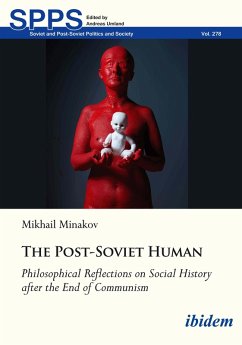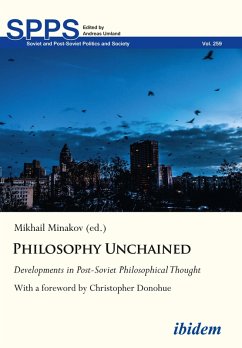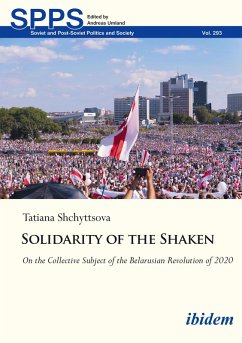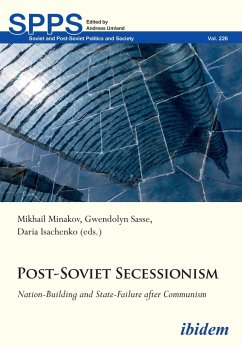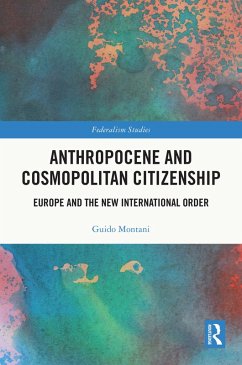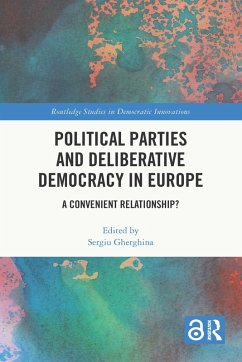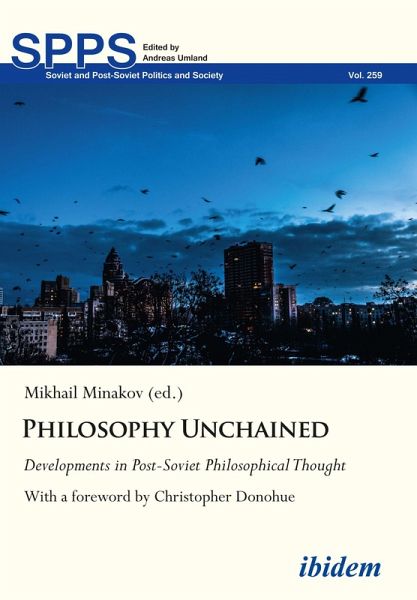
Philosophy Unchained (eBook, PDF)
Developments in Post-Soviet Philosophical Thought With a foreword by Christopher Donohue
Redaktion: Minakov, Mykhailo

PAYBACK Punkte
0 °P sammeln!
The East European nations' common past in the Soviet Union connects them in terms of both their political histories and the evolution of their philosophical thought. The USSR's dissolution created new opportunities, domestic and international, in science, politics, and business. De-Sovietization meant for philosophy that it lost its former significance as a political-ideological tool of the authorities, and its previous role in society. Philosophers of the former Soviet bloc now found themselves able to communicate with colleagues around the world. This volume's chapters analyze the renewal of...
The East European nations' common past in the Soviet Union connects them in terms of both their political histories and the evolution of their philosophical thought. The USSR's dissolution created new opportunities, domestic and international, in science, politics, and business. De-Sovietization meant for philosophy that it lost its former significance as a political-ideological tool of the authorities, and its previous role in society. Philosophers of the former Soviet bloc now found themselves able to communicate with colleagues around the world. This volume's chapters analyze the renewal of the philosophical enterprise over the last thirty to forty years, in Belarus, Georgia, Latvia, Lithuania, Moldova, Russia, Ukraine, and Uzbekistan. Among its authors are Yevgeniy Abdullaev, Viktoras Bakhmetjevas, Alexandru Cosmescu, Maija Kule, Denys Kiryukhin, Giorgi Khuroshvili, Mikhail Maiatsky, Tatyana Shchittsova, and Mikhail Minakov. "This book is a long-needed assessment of the transformations of philosophy after the fall of the Soviet Union, when a wide range of possibilities opened up for philosophical thinking." -Daniela Steila, University of Turin "This book offers an excellent handle with which to grasp the inherent difficulty of reconciling states, civil societies, and academic knowledge in fraught national settings." -Diana Pinto, Historian "Nothing can help us more incisively than this book to grasp how thinking, though imperceptible and immaterial, can be put and kept in chains or can suddenly break free from chains." -Alessandro Ferrara, University of Rome Tor Vergata "The book offers new and original cartography of the post-Soviet intellectual space and its development." -Nikolaj Plotnikov, Ruhr-University Bochum "But what happened to philosophy in Soviet hands when the Soviet Union faded away? The answer is in this volume." -Ivan Krastev, Centre for Liberal Strategies in Sofia "The book is a must-read not only for those who are interested in a deep understanding of post-Soviet philosophy, its history, and its place in the world but also for those who want to truly explore the inner side of post-Soviet being and consciousness." -Julie Reshe, University College Cork and University College Dublin "It is this overview of the new critical potentials in the post-Communist East that makes the book an obligatory reading for all who care about our common destiny." -Slavoj Zizek, University of London/University of Ljubljana
Dieser Download kann aus rechtlichen Gründen nur mit Rechnungsadresse in A, B, BG, CY, CZ, D, DK, EW, E, FIN, F, GR, HR, H, IRL, I, LT, L, LR, M, NL, PL, P, R, S, SLO, SK ausgeliefert werden.




